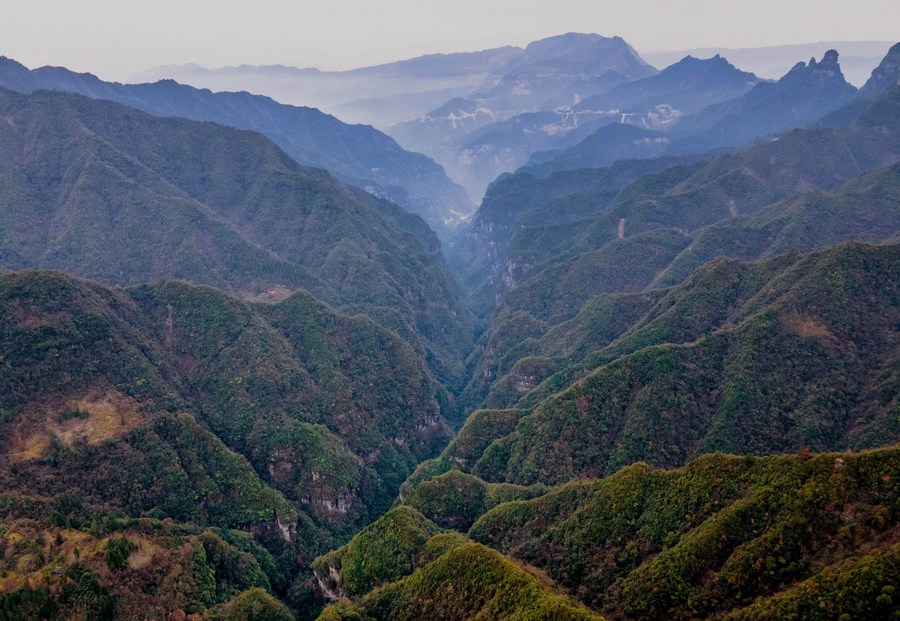|
* Officials and experts worldwide have applauded the success of COP15 and urged all stakeholders to take actions to set a course for a thriving future of a healthy Earth. * With China's presidency, COP15 has adopted the global biodiversity framework ahead of schedule. Canadian Minister of Environment and Climate Change Steven Guilbeault commented that it was "the most significant COP in history," where "we take a bold step forward, to protect nature, to protect the air that we breathe (and) the water that we drink." * Experts across the globe are cheering over the success of reaching a global deal. Agreeing on a shared global goal that will guide collective and immediate action to halt and reverse nature loss by 2030 is "an exceptional feat" for those that have been negotiating the framework, and "a win" for the planet. by Xinhua writers Shi Xiaomeng, Guo Shuang, Lin Wei MONTREAL, Canada, Dec. 20 (Xinhua) -- A crucial United Nations (UN) biodiversity conference, COP15, concluded here early Tuesday with the adoption of a landmark deal aimed at reversing biodiversity loss and setting the world on a path of ecological recovery. COP15, formally known as the 15th meeting of the Conference of the Parties (COP) to the UN Convention on Biological Diversity, wrapped up its nearly two weeks of negotiation after gathering the broadest possible consensus from national delegates, the scientific community, the private sector as well as other interest groups concerning environmental protection. Officials and experts worldwide have applauded the success of COP15 and urged all stakeholders to take actions to set a course for a thriving future of a healthy Earth. 
Huang Runqiu (4th R), COP15 president and China's minister of ecology and environment, and Elizabeth Maruma Mrema (2nd R), executive secretary of the UN Convention on Biological Diversity, applaud after the adoption of the Kunming-Montreal Global Biodiversity Framework, a UN deal aimed at reversing biodiversity loss and setting the world on a path of recovery during the second phase of COP15 in Montreal, Canada, Dec. 19, 2022. (Xinhua/Lian Yi) HISTORIC DEAL The Kunming-Montreal Global Biodiversity Framework was adopted early Monday. The deal includes four goals and 23 targets for achievement by 2030. One of the key targets under the framework calls for having restoration completed or underway on at least 30 percent of degraded terrestrial, inland waters, and coastal and marine ecosystems. It also demands raising international financial flows from developed to developing countries, in particular least developed countries, small island developing states and countries with economies in transition, to at least 20 billion U.S. dollars per year by 2025, and to at least 30 billion dollars per year by 2030. In addition, nations of the world agreed on a package of measures to support the implementation of the goals and targets, including planning, monitoring, reporting and review mechanisms, resource mobilization and Digital Sequence Information, or DSI. DSI, a dominant topic at COP15, has many commercial and non-commercial applications, including pharmaceutical product development, improved crop breeding, and the monitoring of invasive species. Delegates have agreed to establish a multilateral fund within the framework for the equitable sharing of benefits between providers and users of DSI, to be finalized at COP16 in Türkiye in 2024. After the adoption of the framework, Huang Runqiu, the COP15 president and China's minister of ecology and environment, said that the package will guide joint efforts of all parties to halt and reverse biodiversity loss so as to set the world on a path of recovery and benefit all human beings. Describing the deal as historic, Huang said the framework has depicted the vision 2050 of "living in harmony with nature." 
A staff member communicates with participants at the China Pavilion during the second phase of the 15th meeting of the Conference of the Parties to the UN Convention on Biological Diversity (COP15) in Montreal, Canada, Dec. 10, 2022. (Xinhua/Ren Pengfei) STRONG LEADERSHIP China holds the presidency of COP15. It held the phase-one meeting in Kunming, capital of southwest China's Yunnan Province, in 2021. It chaired the second phase of COP15 in Montreal, Canada, with the continued theme of "Ecological Civilization: Building a Shared Future for All Life on Earth." With China's presidency, COP15 has adopted the global biodiversity framework ahead of schedule. "Can we adopt? Yes, no problem." Huang made the remarks time and again while striking his gavel in plenary sessions, gathering assembled delegates' decisions to progress the agenda. Canadian Minister of Environment and Climate Change Steven Guilbeault has commented that it was "the most significant COP in history." "We take a bold step forward, to protect nature, to protect the air that we breathe (and) the water that we drink. And for that, Mr. President, we are extremely grateful," he said. In holding the COP15 presidency, China has shown leadership in global biodiversity protection, Inger Andersen, executive director of the United Nations Environment Programme (UNEP), has said. "China has been phenomenal," Andersen told Xinhua. "I will thank China for its leadership. I think that has been something quite remarkable in complex times. And we have seen China being very steadfast in this regard." 
This aerial photo shows Haizhu Lake in Guangzhou, south China's Guangdong Province, Feb. 24, 2020. (Photo by Xie Huiqiang/Xinhua) In action, China has also made progress in biodiversity protection. A total of 90 percent of the country's terrestrial ecosystem types and 74 percent of key state-protected wild flora and fauna species have been placed under effective protection measures, and the wild populations of over 300 rare and endangered flora and fauna species have been restored and increased, data from the Ministry of Ecology and Environment show. Over the decade, China has enacted or revised more than 20 related laws and regulations, including the Forest Law, the Grassland Law and the Law on the Protection of Wildlife, to improve its biodiversity protection systems. Rose Niu, chief conservation officer at the Paulson Institute, told Xinhua that "as a conservationist ... I am so pleased to see the Chinese government is taking the lead in promoting the concept (of ecological civilization)." The key is to translate the concept into a governance structure, policy package, financing mechanisms and public participation, she said. 
This photo taken on May 19, 2021 shows golden snub-nosed monkeys at Dalongtan Golden Monkey Research Center in Shennongjia National Park of central China's Hubei Province. (Xinhua/Xiao Yijiu) A WIN FOR EARTH Experts across the globe are cheering over the success of reaching a global deal while urging nations to implement their commitments for the future of the planet. Agreeing on a shared global goal that will guide collective and immediate action to halt and reverse nature loss by 2030 is "an exceptional feat" for those that have been negotiating the framework, and "a win" for the planet, said Marco Lambertini, director general of the World Wide Fund for Nature International. "It sends a clear signal and must be the launch pad for action from governments, business and society to transition towards a nature-positive world, in support of climate action and the Sustainable Development Goals," said Lambertini. "The agreement represents a major milestone for the conservation of our natural world, and biodiversity has never been so high on the political and business agenda," he added. 
This aerial photo shows a view of the Qizimei mountain national nature reserve in central China's Hubei Province, Dec. 15, 2022. (Photo by Wang Fajun/Xinhua) Nick Isaac, a macro-ecologist at the UK Center for Ecology and Hydrology, said the post-2020 global biodiversity framework is the nearest thing to a "Paris agreement for nature." "It's an important step forward for the protection of ecosystems, and the new agreement acknowledges the need for equity among nations, as well as the rights of indigenous people," said Isaac. "Given that 190 nations were involved, it's quite an achievement to have agreed on anything." "This agreement means people around the world can hope for real progress to halt biodiversity loss and protect and restore our lands and seas in a way that safeguards our planet and respects the rights of indigenous peoples and local communities," Achim Steiner, administrator of the United Nations Development Programme, said. "Today's agreement is ... a moment that, if answered with actions as agreed, may set a course for a thriving future on a healthy planet that leaves no one behind," he said. (Xinhua correspondents Lin Xiaochun, Kang Yi, Chen Chen in Montreal, Canada also contributed to the story.)(Video reporters: Peng Zhuo, Li Xiaopeng, Lin Wei, Shi Xiaomeng, Huang Yao, Peng Lijun, Martin Mbangweta, Chen Chen and Guo Shuang; video editors: Yu Jiaming, Wei Yin, Zhu Jianhui and Zhou Yang.)
|



